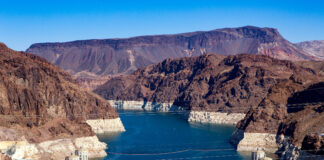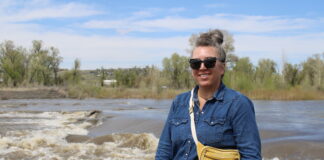
The Colorado General Assembly’s interim Water Resources Review Committee is recommending new legislation that, if approved, could set aside millions to help water-strapped regions of the state meet their obligations to deliver water to Kansas, New Mexico and Texas.
It also recommended another bill designed to curb water speculation. Both measures are expected to be considered by the Colorado General Assembly next year.
Groundwater compact compliance
The committee on Oct. 27 approved a draft bill that creates a Groundwater Compact Compliance and Sustainability Fund to help pay for the purchase and retirement of farm wells and irrigated acreage in the Republican and Rio Grande river basins. The action was taken to reduce groundwater use that diminishes surface flows and ensure compliance with interstate compacts on both rivers. Legislative appropriations and federal revenue would bankroll the fund. The Colorado Water Conservation Board would distribute the money based on recommendations from the Republican River Water Conservation District and the Rio Grande Water Conservation District, with approval by the state engineer.
So how much land are we talking about? To comply with compact water delivery obligations and groundwater sustainability rules, 25,000 acres of irrigated land would have to be retired in the Republican basin and 40,000 acres in the Rio Grande basin by 2029. To date, just 3,000 acres in the Republican and 13,000 acres in the Rio Grande have been retired from production. Absent those reductions, well pumping could be curtailed.
When asked how much money is needed, Sen. Jerry Sonnenberg, R-Sterling, whose district includes the Republican River basin, said the conservation district there is looking for $50 million in addition to the $50 million it already has. Pinning the cost down is difficult; Sonnenberg noted that, “It’s harder to retire farm ground when you have $5 [per bushel] corn than it is when you have $3 corn.”
David Robbins, general counsel to both the Republican and Rio Grande districts, testified at an earlier committee meeting that the Rio Grande would also require at least $50 million on top of the $69 million it has already raised by taxing its farmers for sustainability efforts.
Water speculation
The committee also reported a bill that it views more as a vehicle for further discussion than a finished product. It prohibits the purchaser of a water right from engaging in “investment water speculation” and empowers the state engineer to investigate alleged violations. Investment water speculation is defined as “the purchase of agricultural water rights that are represented by shares in a mutual ditch company in the state with the intent…to profit from the increase in the water’s value in a subsequent transaction…or by receiving payment from another person for nonuse of all or a portion of the water” unless it’s part of a water conservation or instream flow program.
Committee members struggled with trying to balance concerns over speculation with protecting property rights. Sen. Kerry Donovan, D-Vail, committee chair and one of the bill’s sponsors, said she continues to hear from constituents on the West Slope about what looks like investment water speculation and its impact on farming operations. At the same time, she noted other groups are sending “a very conflicting narrative now that we actually have bills to respond to…and the feedback is don’t do anything, slow down.”
Sen. Don Coram, R-Montrose, another bill sponsor, emphasized that “it’s not our intent to take away the ability of a farmer whose 401K is his water [if that water were sold], but somehow we need to put some constraints” on speculative investments. “This bill as written,” he continued, “probably doesn’t get us there, but it does give us the opportunity to work through the session.”
With that said, Coram proposed an amendment that broadened the bill’s title by shortening it, from a bill “Concerning a Prohibition Against Engaging in Investment Water Speculation in the State” to one “Concerning Water Speculation in the State.” That change provides the bill sponsors with flexibility to flesh it out over the coming months without being locked in to the current text.
Water infrastructure investment
The committee also approved a letter to the state’s Task Force on Economic Relief and Recovery Cash Fund to consider investing money in water projects. The task force was created by the General Assembly last session to receive federal dollars from the American Rescue Plan Act of 2021 and recommend how to spend it. The legislature transferred nearly $850 million into the fund and among the eligible uses are “investment in water, sewer, or broadband infrastructure.”
The legislature convenes Jan.12.
Correction: An earlier version of this article misstated the date the committee met to approve the draft legislation.
Larry Morandi was formerly director of State Policy Research with the National Conference of State Legislatures in Denver, and is a frequent contributor to Fresh Water News. He can be reached at larrymorandi@comcast.net.
Fresh Water News is an independent, nonpartisan news initiative of Water Education Colorado. WEco is funded by multiple donors. Our editorial policy and donor list can be viewed at wateredco.org.
The Water Desk’s mission is to increase the volume, depth and power of journalism connected to Western water issues. We’re an initiative of the Center for Environmental Journalism at the University of Colorado Boulder. The Water Desk launched in April 2019 with support from the Walton Family Foundation. We maintain a strict editorial firewall between our funders and our journalism.





